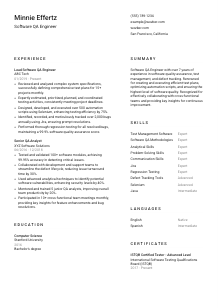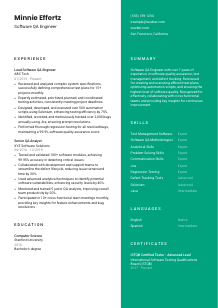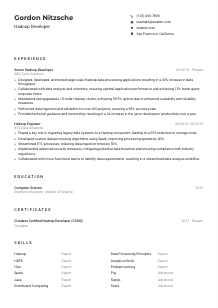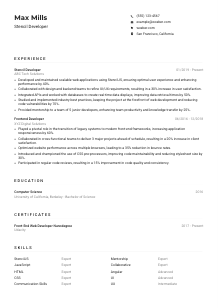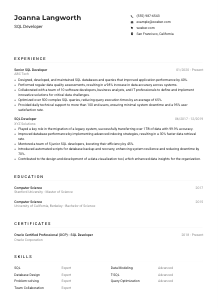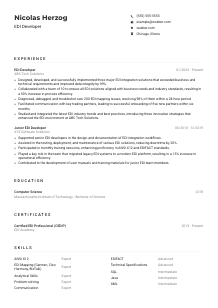Software QA Engineer Resume Example
Making sure the code's clean, but your resume's got bugs? Debug with this Software QA Engineer resume example, written using Wozber free resume builder. See how you can seamlessly integrate your quality assurance prowess with job specs, ensuring your career path is as robust as your test suites!
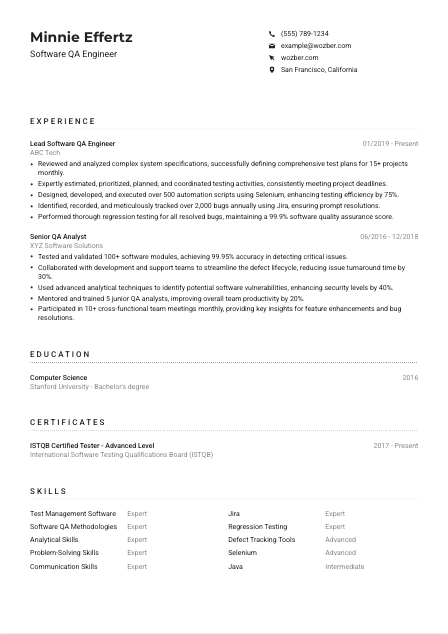
How to write a Software QA Engineer Resume?
Hello, aspiring Software QA Engineer! In the bustling world of technology, securing your dream job means not just crossing the t's and dotting the i's on your resume; it means ensuring your resume speaks the language of quality assurance and stands up to the scrutiny of both human eyes and Applicant Tracking Systems (ATS). Leveraging Wozber's free resume builder, this guide will empower you to tailor a resume that not only ticks all the boxes but leaps off the page, showcasing your expertise in a way that feels nearly bug-free.
Ready to elevate your resume game? Dive in, and let's transform your resume into a testament to your Software QA Engineering prowess!
Personal Details
First impressions matter, and in the world of job applications, your personal details section is the handshake before the digital conversation. Let's perfect this section for your Software QA Engineer application, making sure it's polished, professional, and aligned with the job specifications.
1. Name and Title
Your name is more than just identification; it's the headline of your professional story. Ensure it's prominently displayed in a clean, large font. Directly beneath your name, align yourself with your desired role by specifying "Software QA Engineer," mirroring the job title. This immediate alignment sets the tone for your focused expertise.
2. Contact Information
The devil's in the details. Include your phone number and a professional email address (think firstname.lastname@gmail.com over partydude92@gmail.com). This is no place for errors, so double-check these for accuracy. If relocation is a non-issue - like our San Francisco-based role specifies - showcasing your local address reassures the hiring manager you're ready to hit the ground running.
3. Location Specificity
The job description calls for a local candidate. Tailor your resume to this requirement by clearly stating "San Francisco, California" in your contact details. This not only ticks a key box but cues the employer into your logistical readiness, sidestepping any relocation concerns from the get-go.
4. Digital Footprint
In today's digital world, your online presence can complement your resume. Include your LinkedIn profile, ensuring it's polished and mirrors the details of your resume. For a Software QA Engineer, a link to a professional portfolio or GitHub account can further underscore your expertise and dedication to your craft.
5. Keep It Professional
While personality is a plus, save it for the interview. Steer clear of including age, marital status, or photos unless specifically requested. Focus on communicating the essentials that align with the job's requirements, ensuring this section is a beacon of professionalism.
Takeaway
Think of the Personal Details section as your resume's foundation. It's straightforward, yet crucial, setting the stage for the narrative of your professional journey. By aligning it meticulously with the job requirements, you present yourself not just as a viable candidate, but as the candidate. Keep it neat, relevant, and professional, ensuring you're poised for a great first impression.





Experience
The Experience section is where you can shine, showcasing your journey as a Software QA Engineer. By tactically aligning your past roles with the job requirements, you illustrate not just capability, but excellence and dedication to the field. Let's dive into making your experience resonate with your dream role.
- Reviewed and analyzed complex system specifications, successfully defining comprehensive test plans for 15+ projects monthly.
- Expertly estimated, prioritized, planned, and coordinated testing activities, consistently meeting project deadlines.
- Designed, developed, and executed over 500 automation scripts using Selenium, enhancing testing efficiency by 75%.
- Identified, recorded, and meticulously tracked over 2,000 bugs annually using Jira, ensuring prompt resolutions.
- Performed thorough regression testing for all resolved bugs, maintaining a 99.9% software quality assurance score.
- Tested and validated 100+ software modules, achieving 99.95% accuracy in detecting critical issues.
- Collaborated with development and support teams to streamline the defect lifecycle, reducing issue turnaround time by 30%.
- Used advanced analytical techniques to identify potential software vulnerabilities, enhancing security levels by 40%.
- Mentored and trained 5 junior QA analysts, improving overall team productivity by 20%.
- Participated in 10+ cross‑functional team meetings monthly, providing key insights for feature enhancements and bug resolutions.
1. Decode the Job Description
Begin by dissecting the job description. Highlight keywords and phrases like "test management software," "defect tracking tools," and "automation scripts." These are not just buzzwords; they're indicators of what the hiring manager values. Your task is to reflect these keywords through your past achievements and responsibilities.
2. Present Your Professional Journey
Structure your experience chronologically, leading with your most recent role. For each position, clearly list your job title, company name, and dates of employment. This not only showcases your career progression but also establishes a timeline of your growing expertise.
3. Match Experiences with Job Requirements
Under each role, craft bullet points that mirror the job description. Did you "Design, develop, and execute automation scripts using open-source tools"? Highlight it! Quantify your contributions wherever possible - mentioning "executed over 500 automation scripts, enhancing testing efficiency by 75%" directly demonstrates your impact.
4. Quantify Your Impact
Numbers speak volumes. Whenever possible, quantify your achievements. If you've contributed to a 99.9% software quality assurance score or reduced issue turnaround time by 30%, let those numbers tell the story. This not only emphasizes your proficiency but also gives a tangible measure of your contributions.
5. Relevance is Key
Focus on the experiences most pertinent to your goal role. While your championship in the office ping-pong league might be impressive, prioritize your professional achievements that align with the desired role. Every bullet point should serve as proof of why you're the ideal candidate.
Takeaway
Your Experience section is the core of your resume, a showcase of your Software QA Engineering journey. Tailor each entry to reflect the skills and accomplishments that best match the job requirements. Think like a hiring manager - seek to answer why you're not just a fit, but the best fit for the role. Craft this section with care, ensuring it's a testament to your technical prowess and professional growth.
Education
For a Software QA Engineer, your educational background lays the foundation of your technical competency. Drawing attention to your degrees, especially in relevant fields, is vital. Here's how to showcase your educational achievements in a way that resonates with what employers are seeking for this role.
1. Highlight Your Degree
List your highest relevant degree to align closely with the job's requirements. The job description mentions a "Bachelor's degree in Computer Science, Engineering, or a related field." If you have a degree in one of these fields, mention it prominently. This direct alignment reassures hiring managers of your solid grounding in the necessary principles.
2. Simplify the Structure
Keep your education section clear and to the point. Start with your degree, followed by the field of study, the institution's name, and your graduation year. This structure offers a quick, digestible snapshot of your educational background, making it easy for hiring managers to see you meet the basic requirements.
3. Tailor to Fit
If your degree directly matches one mentioned in the job posting, such as a "Bachelor's degree in Computer Science," it's important to list it exactly as it appears. This not only shows a match with the job requirements but also helps your resume get past ATS filters that may be scanning for specific educational keywords.
4. Mention Relevant Extras
If applicable, include any additional educational highlights such as pertinent courses, honors, or activities, especially if you're early in your career. For instance, suppose you completed a significant project or thesis related to software QA - mentioning it could bolster your application by demonstrating practical application of your knowledge.
5. Consider Certifications
While not strictly part of formal education, relevant certifications, like the "ISTQB Certified Tester - Advanced Level," showcase ongoing learning and dedication to your craft. Include such certifications in this section to further evidence your commitment to the Software QA Engineer profession.
Takeaway
Your educational credentials bear testament to your foundation in the core principles requisite for a successful Software QA Engineer. When detailing your education, ensure it mirrors the qualifications sought by the employer, using clear, concise language that passes both the human and ATS inspection. Remember, this section roots your resume in academic rigor, setting the stage for detailing your professional evolution.
Certificates
In the ever-evolving tech landscape, continuous learning is key, and certifications can significantly bolster your resume. For a Software QA Engineer, specific certifications can set you apart, highlighting your specialized knowledge and commitment to your craft. Let's explore how to effectively showcase these accomplishments.
1. Identify Relevant Certifications
Start by identifying certifications that directly complement the job's requirements. If the job description doesn't explicitly mention certifications, opt for those that are esteemed within the industry, such as the "ISTQB Certified Tester - Advanced Level." This demonstrates both expertise and a proactive approach to professional development.
2. Quality over Quantity
Rather than listing every certificate you've ever received, focus on those most relevant to the Software QA Engineer role you're applying for. This targeted approach ensures your resume remains focused and reflects a strategic fit for the position. It also makes it easier for hiring managers to recognize your pertinent qualifications.
3. Provide Context
For each certification, provide a brief context - the issuing organization and the acquisition (or expiry) date can be particularly insightful. This not only demonstrates the recency of your expertise but also offers a timeline of your continuous learning efforts, which is highly valued in the dynamic field of Software QA.
4. Stay Current
The software industry evolves at a rapid pace, making it crucial to stay updated with the latest certifications and learning opportunities. By showing that you're invested in keeping your skills fresh and aligned with industry standards, you send a strong message about your dedication and proactive stance towards your career development.
Takeaway
In a field as competitive and fast-paced as Software QA Engineering, certifications can play a pivotal role in setting you apart. They reflect not just your current skills but also your commitment to staying ahead of the curve. Highlight the most impactful certifications to paint a picture of a dedicated, continuously evolving professional, perfectly primed for the challenges of today's technology landscape.
Skills
The Skills section of your resume is your professional arsenal at a glance. For a Software QA Engineer looking to stand out, it's imperative to align your skills with the specific demands of the role. Here's how to craft a compelling skills snapshot that resonates with the needs of your dream job.
1. Match Job Description Keywords
Start with the job description and pick out key skills like "Proficiency in test management software," "Excellent analytical and problem-solving skills," and "Effective oral and written English communication skills." These aren't just prerequisites; they're your cue to draw direct parallels between what you excel in and what the job demands.
2. Balance Hard and Soft Skills
While technical proficiency is key, don't overlook the power of soft skills. Your ability to analyze problems effectively, communicate efficiently, and work seamlessly within cross-functional teams is invaluable. Illustrate a well-rounded skill set that combines both technical prowess and the softer skills that enhance team dynamics and project success.
3. Prioritize Relevance
Your skills section should be a curated list, not an exhaustive inventory. Focus on the most impactful skills for the Software QA Engineer role, drawing from both the job description and your personal arsenal. This strategic emphasis ensures your resume resonates with the specific requirements and interests of your prospective employer.
Takeaway
In crafting your Skills section, think of yourself as a software package. What features (skills) will make you irresistible to the end-user (hiring manager)? By closely aligning your skills with the job description and showcasing a balanced mix of technical and soft skills, you position yourself as a comprehensive, well-rounded candidate, fully equipped for the challenges of the Software QA Engineer role.
Languages
In our globalizing world, language skills can significantly enhance your professional profile, especially in tech roles that may involve collaboration across borders. While the core focus for a Software QA Engineer might not be on linguistic prowess, let's explore how to tactfully include language skills in your resume.
1. Address the Basics
If the job description highlights language requirements, as our example does with "Effective oral and written English communication skills required," prioritize showcasing your proficiency in these areas. This baseline qualification is often non-negotiable, so clear articulation of your fluency can be a key checkmark in your favor.
2. Showcase Additional Languages
Additional languages should be listed thereafter, especially if they add value to the role or the company's market presence. Being fluent in additional languages, such as Spanish in our example, can set you apart in a diverse working environment or in roles where international QA standards or projects are relevant.
3. Be Honest About Proficiency
Use standardized terms like "Native," "Fluent," "Intermediate," and "Basic" to describe your language skills. This provides a clear, unambiguous understanding of your linguistic capabilities, helping employers gauge where you might fit into global or multilingual teams.
4. Consider the Role's Global Impact
For roles with international exposure or companies with global operations, showcasing language skills beyond the basics can be particularly beneficial. It signals your ability to navigate and contribute to diverse cultural contexts, enhancing your appeal as a candidate well-suited for a global stage.
5. Language as an Asset
Even if the job description doesn't explicitly call for additional languages, consider your multilingual ability as an asset. It reflects adaptability, learning capacity, and an openness to diverse perspectives, qualities that enhance any candidate's profile in the dynamic field of software quality assurance.
Takeaway
Your ability to communicate across languages is much like software localization – it ensures your skills and contributions can transcend boundaries and adapt to different contexts. Whether essential to the role or an added bonus, language skills speak volumes about your versatility and readiness to engage in a globally connected workplace. List them with honesty and strategic thought, considering how they complement your core qualifications as a Software QA Engineer.
Summary
Think of the summary as the headline feature of your professional software package, your resume. It's where you distill your expertise, achievements, and skills into a compelling narrative that grabs attention. For a Software QA Engineer looking to make an impact, let's tailor a summary that showcases your fit for the job with precision and flair.
1. Capture the Job's Essence
Your first step is to encapsulate the spirit of the role based on the job description. A Software QA Engineer's role is methodical and analytical but also demands creativity in solving complex problems. Reflect these qualities in your summary, presenting a balanced view of your analytical prowess and problem-solving acumen.
2. Lead with Your Professional Identity
Begin with a succinct introduction to your professional self. Mention your years of experience and areas of specialization, focusing on those that resonate most with the job at hand. For instance, emphasizing your expertise in "creating and executing efficient test plans" directly aligns with the expectations for a Software QA Engineer.
3. Highlight Key Skills and Achievements
Pinpoint a few of your skills and major accomplishments that mirror the job requirements. This could include your proficiency in automation scripts, your role in bug resolution processes, or specific methodologies you've mastered. It's about painting a vivid picture of your capabilities and how they've tangibly impacted your previous roles.
4. Keep it Concise and Compelling
While it might be tempting to share every success, remember that brevity is key. Aim for 3-5 lines that encapsulate your professional essence, being mindful to weave in the core requirements of the role. This snippet of your career should entice the reader to delve deeper into your resume, eager to learn more about your journey.
Takeaway
Your summary is the 'hook' of your resume, capturing the essence of your professional narrative in a few powerful lines. For a Software QA Engineer, it's where you align your technological expertise and analytical skills with the needs of your prospective employer. Craft it with care, ensuring it serves as a compelling entry point that highlights your ability to excel in the role. Let this section sing your praises, setting the tone for the detailed accomplishments to follow.
Launching Your Software QA Engineer Journey
Congratulations on navigating the intricacies of tailoring your resume for a Software QA Engineer position. With each section thoughtfully crafted to reflect the unique requirements of your target role, your resume is no longer just a document; it's a narrative of your capabilities, a testament to your fit for your dream job. Lean on the insights shared, utilize Wozber's free resume builder, including the ATS-friendly resume template and ATS resume scanner for optimization, and let your resume be the key that unlocks new opportunities.
Your journey towards becoming a Software QA Engineer is well underway – here's to making each application count and paving the way to your success!

- Bachelor's degree in Computer Science, Engineering, or a related field.
- Minimum of 3 years of experience in software quality assurance or a related field.
- Proficiency in test management software and defect tracking tools.
- Strong knowledge of software QA methodologies, tools, and processes.
- Excellent analytical and problem-solving skills.
- Effective oral and written English communication skills required.
- Must be located in San Francisco, CA.
- Review and analyze system specifications to define test plans.
- Estimate, prioritize, plan, and coordinate testing activities.
- Design, develop, and execute automation scripts using open-source tools.
- Identify, record, document thoroughly, and track bugs using bug tracking systems.
- Perform thorough regression testing when bugs are resolved to ensure the highest level of quality.





